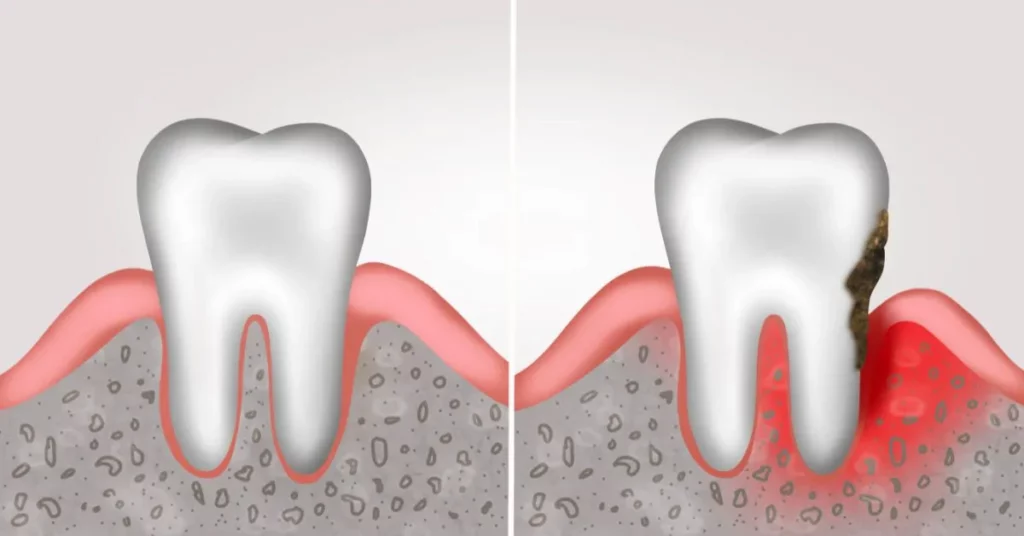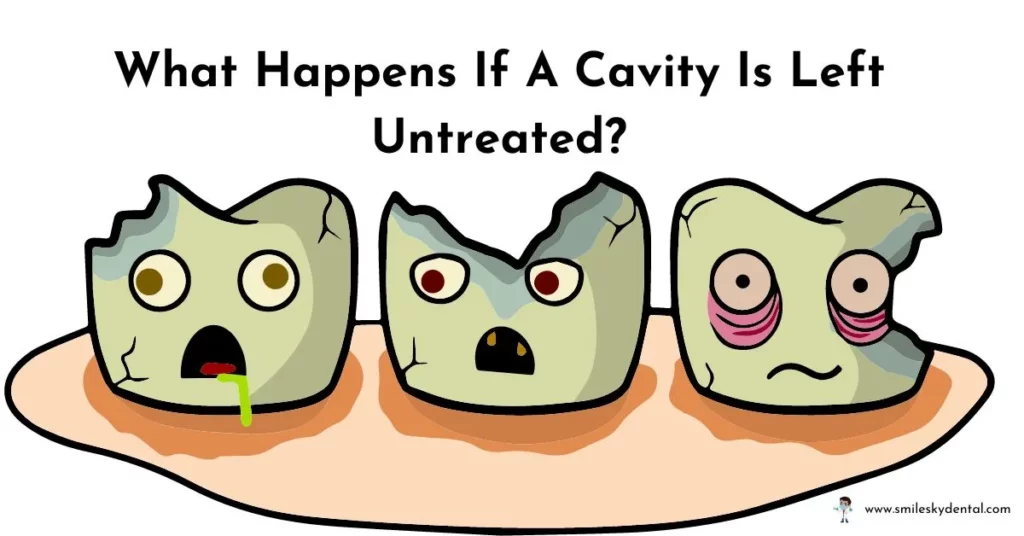Have you ever wondered what happens if a cavity is left untreated? If yes, then you are not alone!
What Exactly is a Cavity?
A cavity is a small hole caused by tooth decay. A buildup of germs and plaque on the teeth often results in decay. This happens because the acid they create eats away at the enamel of the teeth.
What If You Leave A Cavity Untreated?
Several serious dental issues can develop from untreated cavities. When a cavity is ignored, the tooth’s decay spreads and worsens. It eventually results in tooth loss and even systemic health issues. This article will explore what happens if a cavity is left untreated.
The Decay Continues to Spread
Untreated cavities cause the decay in the tooth to spread further. The germs will eat away at the tooth’s enamel until they reach the dentin and pulp, which are located inside the tooth. This may result in the tooth becoming infected and inflamed, which would be very painful.
Abscess Formation
An abscess may develop if a cavity is left untreated. A pus-filled space that develops in the gum tissue is called an abscess. This can cause swelling, redness, and intense pain.
Tooth Loss
Untreated cavities might result in tooth loss. The decay can weaken the tooth, causing it to break or crack. In some cases, the tooth can get enough damaged that it cannot be repaired and must be extracted.
Gum Disease

Gum disease can develop as a result of untreated cavities. Inflammation and infection may result from bacteria from tooth decay spreading to the gum tissue. This can eventually result in gum disease, which can result in gum recession, tooth loss, and even systemic health issues.
Systemic Health Problems
Untreated cavities can also allow bacteria to spread to other parts of the body, posing a threat to overall health. According to studies, untreated oral infections have been linked to heart disease, stroke, and respiratory infections.
Prone to Cavities: What Can You Do?
You can take a number of steps to reduce your chance of getting cavities. These include practicing proper oral hygiene habits, such as regular brushing and flossing.
It also helps when you avoid meals and beverages high in sugar and acid, and schedule routine dental examinations and cleanings. Additional preventive measures like fluoride treatments or tooth sealants also work.
Cavity FAQs
Are Deep Grooves in Teeth Bad?
Fissures, which are deep grooves in teeth, can act as a breeding ground for bacteria and plaque, which can cause tooth decay. Deep grooves are a normal component of a person’s tooth anatomy, although they aren’t always a sign of decay. Our dentists at Smile Sky Family Dental can assess your individual situation and recommend any necessary preventative measures, such as sealants, to protect against decay.
What Happens if You Don’t Get Cavities Filled?
Untreated cavities will spread and result in tooth loss if not treated. Additionally, the bacteria that caused the decay can spread to other teeth. This can result in more cavities as well as the possibility of gum disease and other systemic health issues.
When is a Tooth Too Far Gone?
A tooth is considered “too far gone” when the decay has reached the pulp, or nerve, of the tooth. At this point, a root canal may be necessary to save the tooth. However, if the decay is too extensive, it might be necessary to extract the tooth and replace it with a dental implant or bridge.
How Long Can a Cavity Go Untreated?
The length of time a cavity can go untreated varies depending on the individual and the severity of the cavity. It’s important to remember that the longer a cavity goes unattended, the more harm it may do to the tooth and the more severe the required treatment will be.
What Shall I Do If I Have a Cavity But Can’t Go to the Dentist?
If you are unable to go to the dentist for a cavity, there are temporary measures you can take. To alleviate pain and prevent further decay you can use over-the-counter pain relievers. You should also avoid sugary and acidic foods, and practice good oral hygiene.
I Have a Cavity But It Doesn’t Hurt, Can I Wait a Month to Fill It?
Even if a cavity isn’t hurting, it should be treated right away to stop further decay and possibly tooth loss. To decide what steps to take in your particular circumstance, you can consult our dentists at Smile Sky Family Dental.
How Many Cavities is Normal in a Lifetime?
A person’s lifelong cavity risk can vary greatly depending on a number of variables, including genetics, nutrition, and dental hygiene practices. However, many people can completely avoid cavities with the right preventative measures and routine dental exams.
Cavity Doesn’t Hurt: Do I Still Need to Get it Filled?
It is important to have a cavity filled as soon as possible, even if it is not hurting. Cavities won’t go away by themselves. Not treating them can result in more severe oral health issues. It is sometimes necessary to seek treatment because a cavity that does not cause pain may have grown to a more serious stage.
Can I Wait a Month to Fill a Cavity?
While it’s ideal to get a cavity filled as soon as possible, most of the time waiting a month is not a problem. The possibility that a cavity may worsen and even develop into a more serious oral health problem increases the longer you wait to have it filled. It is best to make a dental appointment as soon as you can in order to have the cavity filled.
What Happens If You Don’t Get a Cavity Filled?
If a cavity is not filled, the decay will spread and may become more serious, compromising your oral health. A root canal or even tooth extraction may be required if the decay has spread to the nerve of the tooth, which can cause severe pain. In some cases, the decay can also spread to surrounding teeth, leading to additional cavities and potential tooth loss.
Do All Cavities Cause Pain?
It is important to remember that not all cavities will cause pain. In fact, a dentist may be the only person who can find some cavities during a routine examination or by using X-rays. This is why it’s important to have frequent checkups with your dentist, even if you don’t have any dental pain or discomfort.
Conclusion
In conclusion, it’s important to have a cavity filled even if it doesn’t hurt. Now that you know what happens if a cavity is left untreated, you can protect your tooth’s health and stop further decay by doing this. Regular dental checkups can also aid in the early detection of cavities, helping to prevent pain or the development of more serious tooth issues.
If you have any concerns about cavities or other oral health issues, you can talk to our dentists at Smile Sky Family Dental. Get in touch today to avail the best dental services in Norcross, GA. Don’t believe us? Don’t worry, we’ve got the reviews to do the talking!


